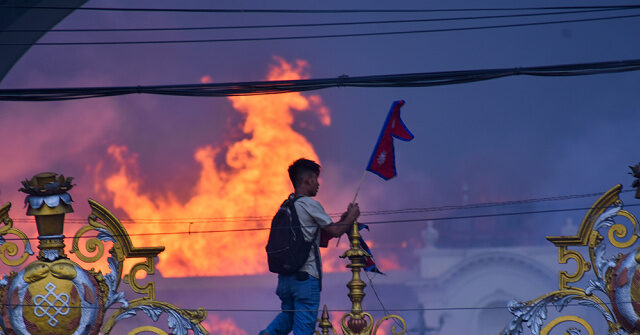The young protesters who overthrew the government of Communist Party leader K.P. Sharma Oli last week also made a point of storming the Communist Party headquarters and throwing down its infamous hammer and sickle flag.
Prime Minister Oli announced his resignation last Tuesday, driven from office by the huge youth protests known as the “Gen Z Movement.”

The incident that sparked the protest was Oli’s government attempting to ban most popular social media platforms. The ban has since been rescinded, but protesters said it was just the spark that ignited years of anger about mounting government corruption. The movement truly caught fire after several protesters were gunned down by the police.
Oli represented the Communist leg of a triple alliance that also included Nepal’s Maoists and the socialist Nepali Congress Party. The ruling alliance has fended off a few other challenges to its power over the years, but seemed completely incapable of dealing with the large, energetic, and spontaneous protests unleashed by the social media ban.
This could be partly due to the vast gulf that has opened between Nepal’s political elite and ordinary citizens. As the Gen Z protesters explained to reporters, the social media ban did not just stifle their ability to speak and organize politically — it threatened to eliminate online platforms they were using to find jobs and run their business ventures.
Nepal has a total of eight major political parties, and all of them signed a joint statement on Saturday objecting to the dissolution of parliament by President Ram Chandra Poudel.
Poudel was responding to a demand by the Gen Z protesters to dissolve parliament and hold new elections by March 5, 2026. He expressed hope that granting these demands would encourage the protesters to resume constructive participation with Nepali government.
“The constitution is alive, the parliamentary system is alive and the federal democratic republic still exists. People have an opportunity to move forward in the path of a more efficient democracy by conducting elections within six months,” he said.
The letter signed by the eight parties demanded the immediate reinstatement of parliament, arguing that Poudel lacked the constitutional authority to dissolve it.
In addition to dissolving parliament on Friday, Poudel swore in a new prime minister, former supreme court justice Sushila Karki. Karki was one of three candidates for interim prime minister who was acceptable to the protesters.
“We have to work according to the thinking of the Gen Z generation. What this group is demanding is the end of corruption, good governance and economic equality,” she said.
Karki added that she would work to bring the demonstrators who vandalized residences and government buildings to justice. At least 50 fatalities were reported during clashes between protesters and riot police, while dozens of buildings were set on fire, including the Communist Party headquarters and former Prime Minister Oli’s residence.
“I feel ashamed. If they were Nepalis who destroyed these essential structures, how can they be called Nepalis,” she said.
Radio Free Asia (RFA) reported on Friday that Nepal’s Gen Z uprising is being carefully watched in Vietnam, where a Communist government has been mired in corruption, and dissidents have been silenced with heavy online censorship. Vietnamese youth could begin dreaming of overthrowing their supposedly invincible Communist overlords, the same way young people in Nepal just did.
“In Nepal, a fragile democracy is heavily influenced by entrenched elites from the Communist movement. In Vietnam, the Communist Party holds complete control and often emphasizes the superiority of its ideology. That’s why what happens in Nepal matters to people in Vietnam,” RFA explained.
“As Nepal’s protests unfold, Vietnamese youth are watching with interest. The events in Nepal may not predict Vietnam’s future, but they highlight questions many young people across Asia are asking today,” RFA concluded.
Read the full article here


